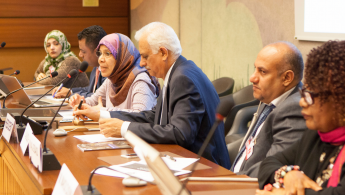Yemen in Focus: 'No women, no government' movement demands political participation
A feminist movement, which has stepped up a campaign dubbed 'No Women, No Government' in recent weeks, described the move as an "unfair discrimination against women’s rights to political participation".
"We hold the the president, prime minister and heads and secretaries of political parties and forces, as well as the Southern Transitional Council, accountable," a statement said.
"Yemeni women are the lifeline and partners in the battle to restore the state at all levels. They are the ones bear the responsibilities of their families on their shoulders, of which the burden has been doubled due to the war," the movement, comprised of more than 50 local women's groups across the country, said.
"We assure them that we will not abandon defence of their right to participate in the public sphere."
The statement was released after Yemen's internationally recognised government and southern separatists formed a new cabinet on Friday, forging a joint front against Houthi rebels who have seized much of the north.
The new government was formed under the auspices of Saudi Arabia, which leads a military coalition against the Iran-backed Houthis, who took control of the capital Sanaa in 2014.
The new government includes ministers loyal to President Abedrabbo Mansour Hadi and supporters of the secessionist Southern Transitional Council (STC), as well as other parties, a government official told AFP, though no women are involved.
Twitter Post
|
"This campaign was launched to implement the National Dialogue Conference [NDC] outcome to grant women a quota of at least 30% in all decision making positions," Hooria Mashhour, former minister for human rights and current member of the technical advisory group for the UN envoy’s in Yemen told The New Arab.
"That came after leaked news that the forming of the new cabinet in Yemen excluded women totally," she added.
But more than anything, she said, "this is a political right."
“We have been striving since 2003 to connect women to decision making positions and the [NDC] outcomes emphasised that women should be granted a percentage of not less than 30% in all decision-making positions.
"This means the government and parliament for what is elected, the judiciary, as well as any national mechanism that is established, such as the Supreme Committee for Elections or the anti-corruption body," she added.
More than 100,000 people, mostly civilians, have been killed and millions displaced in Yemen's grinding five-year war, which has triggered what the United Nations has called the world's worst humanitarian disaster.
While the new government brings together all factions that oppose Houthi forces, deep divisions have grown between the forces, and the Riyadh-sponsored talks pushed a power sharing agreement designed to mend the rifts.
Prime Minister Maeen Said has retained his position in the new government, which comprises of 24 ministers, while changes have taken place in several ministries, including the foreign ministry.
But these changes are just not enough for those that want a complete overhaul of the government, including founder of Yemen Aid, Summer Nasser.
Read also: Yemen in Focus: Could US terror designation be used to leverage Houthis?
"We cannot support all women for the sake of supporting women - there are some that are just as corrupt as the men involved in the current cabinet," Nasser told The New Arab.
"Right now, the government is not functioning as a government - there is no sovereignty in decision making so we won’t be able to make any changes," she said. "Even the names on the cabinet have to be approved by outside forces.
"I do recognise women must be involved in decision making across the board, but the state is not in its normal function. Until that happens, we, as women, should throw some effort into recognising the corruption of this government, start building national sovereignty, then demand the right for political participation in the top posts," she said.
"It must start from the bottom-up, not up to bottom," Nasser noted.
"Women or man, if you have a questionable background, we shouldn’t support you," she said, noting this is counter-productive and continues an ongoing cycle of corruption and bad governance.
"We must break that cycle and bring in people that are clean - anything else makes no sense," Nasser added.
Yemen In Focus is a regular feature from The New Arab.
Sana Uqba is a journalist at The New Arab.
Follow her on Twitter: @Sanasiino



